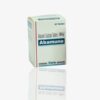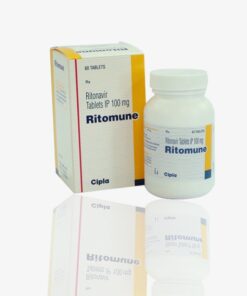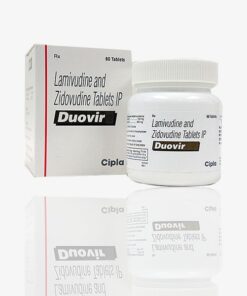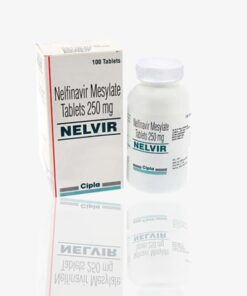Buy Daruvir : Darunavir 300 mg Tablets Online
$94.47
Brand Name : Daruvir
Composition : Darunavir
Manufactured by : Cipla Ltd.
Strength : 300 mg
Form : Tablets
Packing : Pack of 60 Tablets
Prescription Required *
Daruvir is a medication containing Darunavir, an antiretroviral drug used in the treatment of HIV infection. It belongs to the class of protease inhibitors that blocks the functions of protease enzymes in the virus, preventing it from replicating and spreading further in the body.
Uses:
Daruvir is used in the treatment of HIV-1 infection in adults and children, in combination with other antiretroviral medications. It cannot cure HIV infection, but it can slow down the progression of the disease and improve the quality of life of the patient.
HOW TO USE:
Daruvir tablets are taken orally, with or without food, as directed by the doctor or pharmacist. The dosage and duration of treatment may depend on various factors, such as the patient’s age, weight, medical condition, and other medications taken. Do not crush or chew the tablet, swallow it whole with a glass of water.
Storage Conditions:
Daruvir tablets should be stored at room temperature, away from direct sunlight, moisture, and reach of children. Do not keep the medication past its expiry date.
Mechanism of action:
Daruvir contains Darunavir, which selectively inhibits HIV-1 protease enzymes, preventing the virus from replicating and releasing new particles. The drug blocks the maturation of the virus, making it unable to infect new cells and further spread in the body.
Precautions:
Before taking Daruvir, the patient should inform the doctor of any allergies, medical history, or current medications taken. The drug may interact with other medications or cause adverse reactions in patients with pre-existing medical conditions. The patient should also avoid drinking alcohol and grapefruit juice while taking Daruvir.
Contraindications:
Daruvir should not be taken by patients with severe liver disease, allergy to Darunavir, or strong CYP3A4 inducers. It is also not recommended for pregnant or breastfeeding women, as it may harm the baby.
Drug Interactions:
Daruvir may interact with other medications, such as rifampicin, St. John’s Wort, anticoagulants, anticonvulsants, and other protease inhibitors. The patient should inform the doctor of any other medications taken to prevent drug interactions.
Overdose:
In case of overdose, the patient should seek medical attention immediately, as it may cause severe side effects, such as liver damage, kidney failure, or cardiovascular disease.
Side Effects:
Daruvir may cause mild to severe side effects, such as nausea, diarrhea, vomiting, headache, fatigue, rash, or itching. The patient should contact the doctor if the symptoms do not improve or become severe. In rare cases, Daruvir may cause severe allergic reactions or liver problems, which require immediate medical attention.













Reviews
There are no reviews yet.